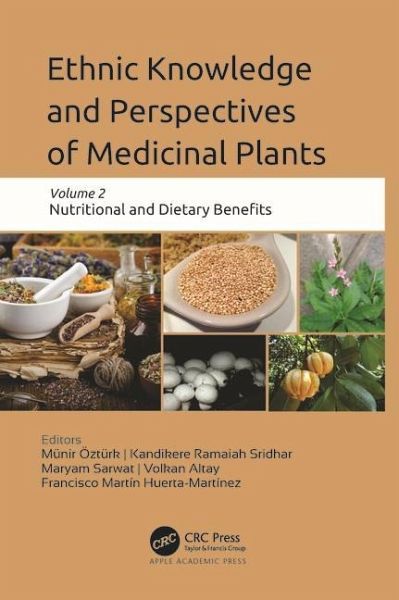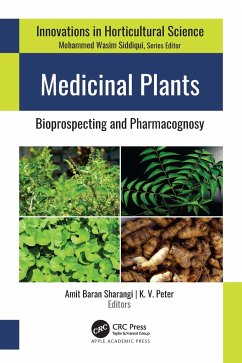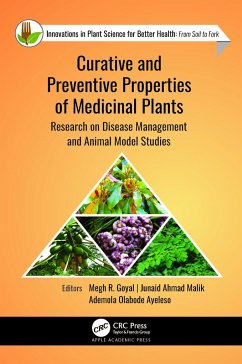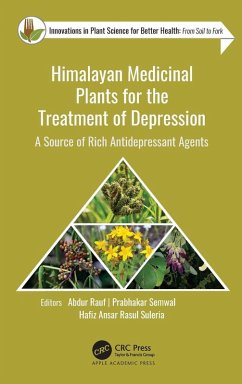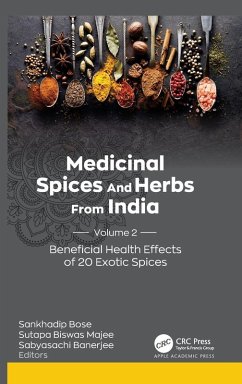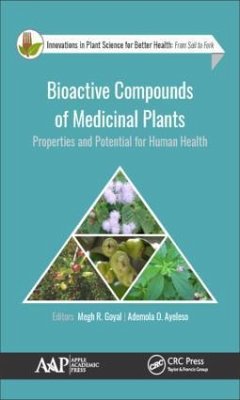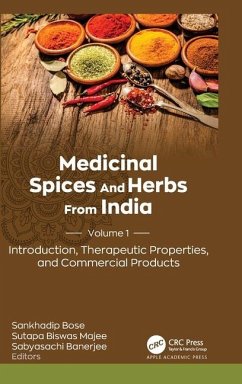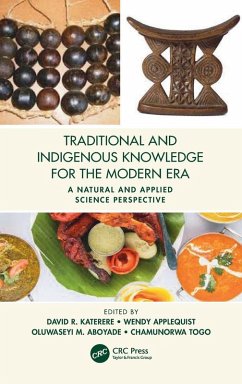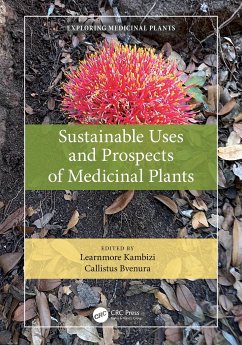Gebundenes Buch
Ethnic Knowledge and Perspectives of Medicinal Plants
Volume 2: Nutritional and Dietary Benefits
Herausgeber: Öztürk, Münir; Sarwat, Maryam; Sridhar, Kandikre Ramaiah
Versandkostenfrei!
Versandfertig in 1-2 Wochen
Weitere Ausgaben:

PAYBACK Punkte
113 °P sammeln!




Looks at traditional medicinal plants for their nutritional benefits, while also encouraging the preservation of biodiversity. It presents information on over 2200 vascular plant taxa from 127 families and many taxa from leaf parts, fruits, underground parts, floral parts, seeds, and more. Also discusses wild edible mushrooms (206 species).
Münir Öztürk, PhD, DSc, has served at the Ege University Izmir, Turkey, for 50 years in various positions. He is currently a Vice President of the Islamic World Academy of Sciences. He has received fellowships from the Alexander von Humboldt Foundation, the Japanese Society for Promotion of Science, and the National Science Foundation (USA). Dr. Ozturk has served as Chairman of the Botany Department and Founding Director of the Centre for Environmental Sudies an Ege University, Izmir, Turkey. He was also a Consultant Fellow at the Faculty of Forestry at at Universiti Putra Malaysia, Malaysia, and a Distinguished Visiting Scientist at the International Center for Chemical and Biological Sciences (ICCBS) at Karachi University, Pakistan. His fields of scientific interest are plant ecophysiology, medicinal and aromatic plants, conservation of plant diversity, biosaline agriculture, and crops, pollution, and biomonitoring. He has published 50 books, 80 book chapters, and 200 papers in journals with significant impact factors. Dr. Öztürk holds PhD and DSc degrees from Ege University, Turkey. Kandikere R. Sridhar, PhD, is Adjunct Professor in the Department of Biosciences, Mangalore University, and Yenepoya (Deemed to be University), both in Konaje, India. His main area of research is the "Diversity and Ecology of Fungi of the Western Ghats, Mangroves and Marine Habitats." He was a NSERC postdoctoral fellow/visiting professor at Mount Allison University, Canada; Helmholtz Centre for Environmental Research-UFZ and Martin Luther University, Germany; and Center of Biology, University of Minho, Portugal. He was recipient of The Shome Memorial Award (2004) and the Lifetime Achievement Awardee (2019), given by the Mycological Society of India, of which he was Vice-President (2013) and President (2018). He was a recipient of The Fellow of Indian Mycological Society, Kolkata, India (2014); and Distinguished Asian Mycologist (2015) and Outstanding Leader in Education and Research from the Association of Agricultural Technology of Southeast Asia (2016). He was a University Grants Commission Basic Scientific Research Faculty Fellow (2014-2017). He is one among the world top 2% scientists in the field of mycology (2020-21), as assessed by Stanford University, the Alper-Doger Scientific Index, and Elsevier. He has over 450 publications and eight edited books to his credit. Maryam Sarwat, PhD, is Associate Professor at Amity University, Noida, India. She completed her PhD at Jamia Hamdard University and did her Postdoctoral Research at the International Centre for Genetic Engineering and Biotechnology (ICGEB), India. Dr. Sarwat has published over 44 papers in international journals and five books with Springer Nature, Elsevier, and King Abdul Aziz University Press. She has three books (with Elsevier and Taylor and Francis) in progress. Her cumulative impact factor is 152 with 2400 total citations, an h-index of 20, and an i-10 index of 28. She has received a "Scientist of the Year Award" from the National Environment Science Academy (NESA), India. Dr. Sarwat has served as the guest editor of the special issue for Current Pharmaceutical Design (impact factor 3.2) and Seminars in Cell and Development Biology (impact factor 7.7). She is a reviewer and editorial board member of more than 10 international journals. Volkan Altay, PhD, is a full Professor in the Biology Department, Faculty of Science and Arts, at Hatay Mustafa Kemal University, Turkey. His fields of interest are plant ecology, vegetation ecology, taxonomy, biodiversity, biomonitoring and pollution ecology, and sustainable use of medicinal plant resources. He received his PhD in 2009 and holds a proven track record of nearly 100 publications in highly reputed professional journals. He has also published four books, nearly 45 research articles in impact factor journals, more than 40 book chapters and reviews, and more than 70 international and national congress reports. Francisco Martín Huerta-Martínez, PhD, is a biologist and Professor in the Biological and Environmental Division at the University of Guadalajara, Mexico. He has over 32 years of experience in the Applied Ecology Department, where he teaches and does research on ecology. He has administration experience from his role as Chief at the Applied Ecology Department from 2004 to 2007, as the Academic Coordinator of the bachelor's program in biology from 2007 to 2009, and as Coordinator at a doctorate program from 2015 to 2018. His research interests are plant ecology, plant biodiversity and conservation, biotic interactions, ethnobotany, forest ecology, and biological invasions. He has published research papers in prestigious peer-reviewed journals and one international book. Dr. Huerta-Martínez has supervised PhD, MSc, and undergraduate theses. From 2004 to 2010 and from 2018 to now, he has been a member of the National System of Researchers in Mexico. Currently, he is a member of the Ecological Society of America (ESA) and has participated in several of its annual meetings. Dr. Huerta-Martínez earned his MSc (with a specialty in Botany) from Colegio de Postgraduados in Mexico State in 1995 and his PhD (with a specialty in Botany) at the same institution in 2003.
Produktdetails
- Verlag: Apple Academic Press
- Seitenzahl: 668
- Erscheinungstermin: 20. Oktober 2023
- Englisch
- Abmessung: 240mm x 161mm x 40mm
- Gewicht: 1156g
- ISBN-13: 9781774912294
- ISBN-10: 1774912295
- Artikelnr.: 68473829
Herstellerkennzeichnung
Libri GmbH
Europaallee 1
36244 Bad Hersfeld
gpsr@libri.de
Für dieses Produkt wurde noch keine Bewertung abgegeben. Wir würden uns sehr freuen, wenn du die erste Bewertung schreibst!
Eine Bewertung schreiben
Eine Bewertung schreiben
Andere Kunden interessierten sich für




